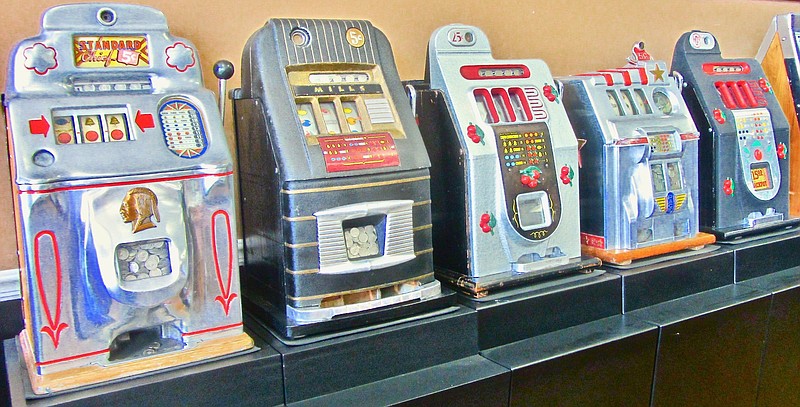HOT SPRINGS — Habitual gamblers are virtually guaranteed to learn the hard way that the odds always favor the house. But there is one place in Hot Springs where bettors are sure to come out even — and have a good time doing so.
The History of Hot Springs Gambling Museum, less known than some Spa City attractions, opened in 2016 in a strip mall along Central Avenue. The location is about a mile south of Oaklawn Park Casino Resort, where legal wagering now flourishes in a town once famous (or infamous) as a bastion of illegal betting and other vices.
On display at the Gambling Museum is David Hill's recently published "The Vapors: A Southern Family, the New York Mob, and the Rise and Fall of Hot Springs, America's Forgotten Capital of Vice."
The museum's trove of 100 or more slot machines, around 20 gaming tables and an array of other paraphernalia call to mind the wide-open decades from the 1870s to the 1960s. The displays evoke the era retold in Hill's book, which sports a title almost as long as the odds of breaking the bank. It is selling well.
More News
The History of Hot Springs Gambling Museum
Where: 3339-C Central Ave. Hot Springs
Hours: 10 a.m.-6 p.m. Wednesday, Friday and Saturday
Phone: Call ahead to (501) 318-7590 or (501) 209-0847
Email: history-of-hot-springs-gambling-museum.business.site
Admission: Free
Visitors to the Gambling Museum are guaranteed to break even, thanks to the free-admission policy of proprietors Chris Hendrix and Lanny Beavers, both lifelong Hot Springs residents. Even more generous is the free play allowed on some of the museum's functioning antique slots machines.
Hendrix and Beavers supply the coins, which give folks the pleasure of pulling the levers on the old-style "one-armed" bandits and hearing the money ching-ching out when they hit a jackpot. Visitors are on the honor system to leave any winnings with the machines.
"For us to provide the coins eliminates any concerns about allowing gambling without a casino license," Hendrix explains. "It eliminates the legal aspects, but does allow the fun."
The free-admission policy, he says, stems from "our goal to share our enthusiasm for history and to help educate people. We'd rather concentrate on enjoyment than business."
Starting the museum was partly motivated by their wives, "because we had acquired so many slot machines and other gambling stuff that they urged us to get our respective homes cleaned up."
A third partner in the enterprise is octogenarian Tony Frazier, an expert at rebuilding slot machines. His Spa Amusement Co. was raided by state troopers one day in 1967, as Gov. Winthrop Rockefeller shut down illegal gambling in the Spa City.
Frazier told the Arkansas Democrat-Gazette's Rex Nelson several years ago that "they hauled truckload after truckload out of my shop." The machines were taken to a rock quarry, run over by bulldozers and then burned. The troopers were taking no chances.
Rockefeller's reforming zeal stifled the illicit gambling in what Hill's book title calls "America's Forgotten Capital of Vice." A half-century later, Frazier still works in a space next to the museum, restoring old slot machines for private owners.
The museum's most prized possessions, according to Hendrix, "are the items actually tied to Hot Springs history in some way. We have 15 slot machines that were used here. We have a very rare Klondike gaming table from the early 1900s that was used here."
Some exhibits come from elsewhere, including a notable piece of cinematic memorabilia. It's a faro table that Hendrix describes as a prop from "the final scene of The Duke's final movie" — John Wayne's 1976 "The Shootist."
Neither Hendrix nor Beavers frequent Oaklawn's thriving casino. Instead, says Hendrix, "we enjoy spending any nonworking time at our museum, visiting with the people who come to check it out."
Hendrix is no fan of 21st-century digital slots. "There's no comparison with the old machines," he says, "There's just something about handling the coins, feeling the mechanics of the machine when you pull the handle and hearing the coins fall into the tray when you win.
